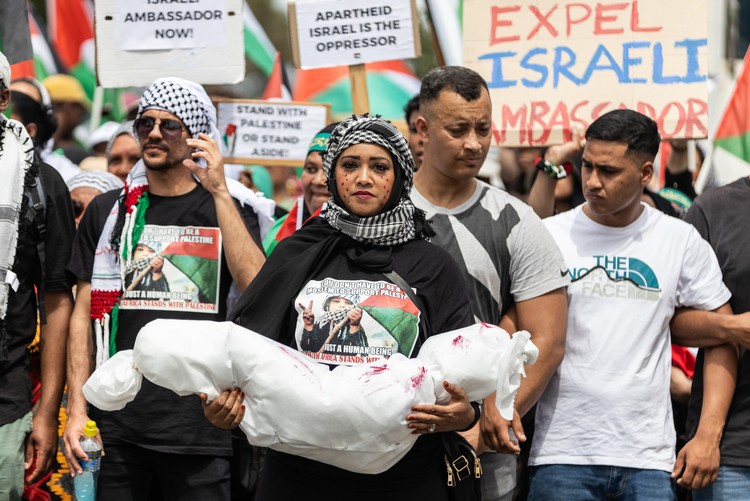
1 November 2023
Fatima Benwell holds up a symbolic body bag during the march. Photos: Ashraf Hendricks
Several hundred protesters gathered outside the Cape Peninsula University of Technology (CPUT) parking lot in Cape Town on Wednesday. They called for a ceasefire in the Gaza Strip and the opening of humanitarian aid corridors to the occupied Palestinian territory. They called for the South African government to shut down the Israeli embassy and to prosecute South Africans who serve in the Israeli Defence Forces (IDF). They also called for boycotts of, divestment from and sanctions against Israel (BDS).
Their protest coincided with the Medium Term Budget Policy Statement by the Minister of Finance.
There have been several large protests in Cape Town since 7 October in support of the Palestinian people.
Protesters chanted “Free Palestine” and “Expel the Israeli ambassador”. Some protestors carried symbolic body bags representing dead civilians in Gaza. There was also a brass band that played songs from the anti-apartheid struggle, such as Senzeni Na.
Several political parties participated, as well as at least 30 members of South African Jews for a Free Palestine. Organisers said they only had a permit to gather and not to march to the City Hall where MPs were gathered.
Jamie Rosengarten of South African Jews for a Free Palestine shares his views. Video: Ashraf Hendricks and Ella Morrison
Reverend Allan Boesak addressed the crowd. He criticised President Cyril Ramaphosa’s response to the conflict. He called for him to shut down the Israeli embassy and join the BDS movement.
“We share this moment of mourning and outrage because the two must come together. If you are not angry at what is happening in Gaza today, at what is happening to the children of Palestine today, then every word of mourning means nothing. That is why we have come together as citizens of Cape Town,” Boesak said.
“We remember what [Nelson] Mandela said: South Africa will never be free until Gaza is free. Why does Cyril Ramaphosa not know that? We were asking from the very beginning, shut down the embassy of this apartheid state. He still has not done that.”
Several hundred people participated in the march.
Mandla Mandela addressed the crowd. He said there had been many calls for a ceasefire at the United Nations, but these had fallen on deaf ears. (The South African government has in fact called for a ceasefire.)
A speaker from Al-Jamah, a Muslim political party, rallied the crowd under the slogan “Viva Hamas”. A minority of members of the crowd chanted with him. He compared Hamas’s actions on 7 October to the armed struggle against apartheid and called for the South African government to send arms to Palestine.
Hamas militants entered Israel from Gaza Strip on 7 October and killed about 1,400 people, mostly civilians. They took over 200 hostages from Israel to the Gaza Strip. Since then Israel has killed approximately 8,000 people in the Gaza Strip and West Bank, mostly civilians, including over 3,500 children. (These figures come from official Israeli and Palestinian sources.) Israel has been occupying the Gaza Strip and the West Bank, known as the Occupied Palestinian Territories, since 1967.
After the speeches, a smaller group of protesters proceeded to the City Hall. There was a tense moment when police told the marchers to go back to the gathering point. The police claimed the march was moving outside the limits of the protesters’ permit.
A woman holds up a symbolic body bag during the march.
Dozens of protesters sat in the road and refused to move. Members of South African Jews for a Free Palestine laid body bags at the police barricade. Many shouted at the police that they had the right to a peaceful protest.
Police negotiated with the march leaders, particularly Boesak, and the marchers were then allowed through, but not to City Hall where the budget speech was being made.
The protest dispersed without incident.
In the last few weeks, South African organisations such as the Desmond and Leah Tutu Legacy Foundation and Defend Our Democracy have joined the calls for an immediate ceasefire.
A statement from Defend Our Democracy last month read: “Watching the distressing visuals on our television screens and on social media daily, we are appalled at Israel’s bombardment, for over two weeks, of hospitals, one of the oldest churches in the world, mosques, shopping centres and residential buildings in Palestine.”
On Thursday, the director of the New York office of the UN High Commissioner for Human Rights resigned over the organisation’s response to the conflict. In his resignation letter Craig Mokhiber said: “The current wholesale slaughter of the Palestinian people, rooted in an ethno-nationalist colonial settler ideology, in continuation of decades of their systematic persecution and purging, based entirely upon their status as Arabs … leaves no room for doubt.”
This came after the US and Israel rejected calls for a ceasefire.
The band ‘Kujenga’, which means “To build” in Swahili performed at the march.